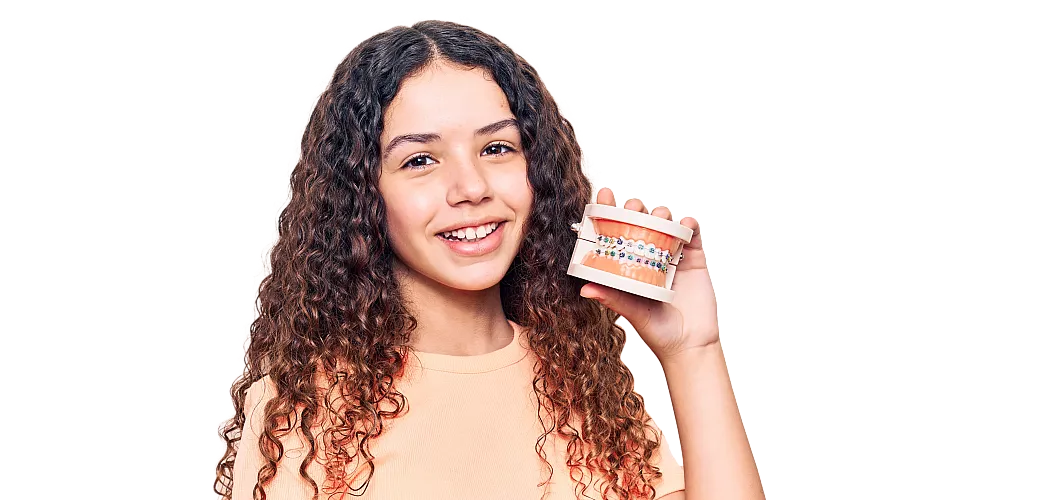
FAQs
You can find answers to all your orthondontics questions here.
Questions from our patients
- ALWAYS remember to brush your teeth after every meal and floss at least once a day.
- Make sure to use toothpaste that contains fluoride, and ask our team or your family dentist if you need a fluoride rinse. This will help prevent cavities!
- If you take out your retainer to eat, make sure you brush your teeth, floss, and remember to keep the retainer safe in its container so it does not get lost or broken.
- Keep your retainer clean, too, by brushing it gently with a toothbrush and toothpaste. You may also soak it in retainer cleaner tablets as instructed by our office. Do not put your retainer in boiling water or in the dishwasher.
- During your treatment, try to avoid foods with a lot of sugar (which increases the amount of bacteria that grows in your mouth, and can cause more plaque and potential cavities).
- Avoid sticky and chewy foods (caramel, chewing gum, gummy bears), hard foods (hard candy, nuts, ice cubes), or any foods that could possibly get stuck in your braces (corn on the cob, soft bagels, ribs, taffy, etc.).
- Be sure to schedule your routine checkups with your family dentist. It is recommended that you continue to visit the dentist regularly throughout your treatment.
With braces, you should brush your teeth at least three times a day to keep your teeth, gums, and mouth healthy and clean. Brushing regularly will help remove any food that may be caught between the braces.
You should also floss daily to get between your braces where your brush isn’t able to reach. We can show you how to brush and floss properly once your braces are placed.
No. It is recommended, however, that patients protect their smiles by wearing a mouthguard when participating in any sporting activity. Mouthguards are inexpensive, comfortable, and come in a variety of colors and patterns.
Phase I, or early interceptive treatment, is limited orthodontic treatment (e.g. expander or partial braces) before all of the permanent teeth have erupted. Such treatment can occur between the ages of six and ten. This treatment is sometimes recommended to make more space for developing teeth, correction of crossbites, overbites, and underbites, or harmful oral habits. Phase II treatment is also called comprehensive treatment because it involves full braces when all of the permanent teeth have erupted, usually between the ages of eleven and thirteen.
Yes. A tooth with a crown will move just like a tooth with a simple filling. When teeth are missing, orthodontic treatment will aid in the alignment of the remaining teeth.
Yes! Regular checkups with your family dentist are very important while in braces. Your family dentist will determine the intervals between cleaning appointments while you are in braces.
Sometimes. It really depends on the situation and that’s why an orthodontic evaluation is important. The overall space available for the teeth does not increase after the age of about 8 years old. In fact, the space available for the permanent teeth to grow in can actually decrease as the last baby molars fall out so the timing of orthodontic treatment can be very important.
- A more attractive smile
- Reduced appearance-consciousness during critical development years
- Better function of the teeth
- Possible increase in self-confidence
- Increased ability to clean the teeth
- Improved force distribution and wear patterns of the teeth
- Better long-term health of teeth and gums
- Guide permanent teeth into more favorable positions
- Reduce the risk of injury to protruded front teeth
- Aids in optimizing other dental treatment
Orthodontic treatment can be successful at any age. Everyone wants a beautiful and healthy smile. Twenty to twenty-five percent of orthodontic patients today are adults.
This initial consultation offers you the chance to get acquainted with our team, explore the world of orthodontics, undergo a comprehensive examination, and identify the treatment options that best suit your needs. We will cover the following during your initial consultation:
- Examine your dental and medical history records
- Conduct a thorough oral examination, which may include digital photos and X-rays, to determine if treatment is required
- Assist in developing a tailored treatment strategy
- Discuss financial details, insurance choices, and payment plans
The position of the teeth, and sometimes entire facial structures, are permanently changed by orthodontic treatment. It is important that the situation be diagnosed properly, and that the treatment be appropriately and properly completed. Orthodontic specialists have the extensive and specialized training that enables them to provide their patients with the professional and personalized treatment that orthodontic treatment requires.
Simply call our office or book your consultation online. We will be happy to schedule an appointment for you. When you call to schedule your appointment, our front office staff will collect some basic information from you.
No, it is not. While many of our patients are indeed referred by their family dentist, many other patients take the initiative to schedule an examination themselves. We are happy to see new patients and give you our opinion.
Invisalign is a unique orthodontic system that straightens your teeth with clear plastic aligner trays, in place of wires and brackets. These aligners are custom-made for your smile, based on a treatment plan created specifically for you by your Orthodontist.
Over the course of your treatment, you will be provided with a number of trays, each tray making small changes to your tooth and jaw alignment. The aligner trays are designed in such a way that each will move your teeth into the desired position, as identified by your Orthodontist; because the trays are clear, they provide patients with a discreet approach to orthodontic treatment.
While you may experience some discomfort when the braces are first applied and after adjustments, this is usually temporary. Over-the-counter pain relief can help manage any discomfort, and most patients adjust to their braces within a few days.
Yes, some signs include early or late loss of baby teeth, difficulty chewing or biting, mouth breathing, and crowded or misplaced teeth. If you notice any of these, it's a good idea to consult with an orthodontist. .
Candidates for braces or Invisalign include individuals with crowded teeth, gaps, overbites, underbites, or other alignment issues. Your orthodontist will determine the best treatment option based on your specific needs.
The duration of orthodontic treatment varies depending on the complexity of the case. On average, treatment with metal braces can take between 18 to 24 months, but your orthodontist will provide a more accurate timeline during your consultation.
It’s recommended to bring your child for an consult with an orthodontist around the age of 7. Early assessment allows the orthodontist to identify potential issues and determine the best time to start treatment.
Absolutely! Braces are not just for children and teens. Metal braces are a popular and effective treatment for adults seeking to improve their smile or correct alignment issues. Orthodontic treatment can significantly enhance oral health, improve bite function, and boost confidence at any age.
